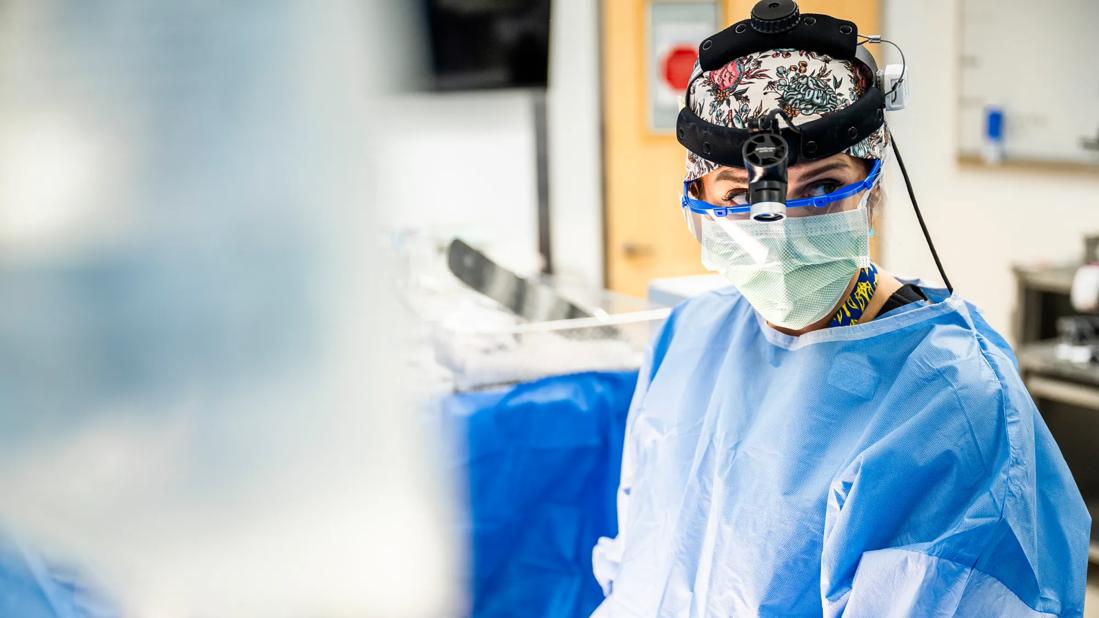Research program sets the stage for clinical trials

Image content: This image is available to view online.
View image online (https://assets.clevelandclinic.org/transform/345fa33f-45d4-4594-b2a9-542ecc0fbe0d/URL_5202236_08-29-24_067_MLC)
Illustration of gut microbes
In recent years, compelling evidence has emerged supporting fecal microbiota transplant (FMT) to optimize cancer treatment response. Experts at Cleveland Clinic are now laying the groundwork for testing the intervention in bladder cancer patients.
Advertisement
Cleveland Clinic is a non-profit academic medical center. Advertising on our site helps support our mission. We do not endorse non-Cleveland Clinic products or services. Policy
Laura Bukavina, MD, MPH, assistant staff of Urologic Oncology in the Department of Urology, has been exploring connections between the microbiome and bladder cancer for nearly a decade.
“My colleagues in melanoma were observing a lot of patients who were not responding to treatment, even though they seemed like they should be. Or they experienced toxicity during treatment, while others—with similar history and clinical characteristics—did not,” she says.
Drawn to these puzzling differences, she thought there could be parallels in bladder cancer, another highly immunologic cancer. While bacteria and immunotherapy are not new concepts to the field of bladder cancer, there are limited large-scale studies focused on the gut microbiome.
“We’ve actually been using bacteria in bladder cancer since the 1970s,” she says, referring to Bacillus Calmette-Guerin (BCG), an intravesical immunotherapy for non-muscle invasive bladder cancers (NMIBCs). BCG is made from an attenuated strain of Mycobacterium bovis and has become a standard adjuvant therapy for treating certain NMIBCs.
Dr. Bukavina and colleagues at Fox Chase Cancer Center and Case Western Reserve University conducted an observational, multicenter study to evaluate possible links between the gut microbiome and responses to neoadjuvant chemotherapy (NAC) in patients with bladder cancer.
Fecal microbiome samples were collected from 142 patients with urothelial carcinoma, the most common type of bladder cancer. They collected stool samples from partners living with patients during treatment to compare microbial environments and control for environmental factors.
Advertisement
While the researchers did not observe a signature biomarker associated with the cancer, they did identify a distinct clustering differentiating the healthy versus bladder cancer cohorts. They also almost monitored changes in patients’ gut microbiome during NAC and found a link between the presence of Bacteroides and a poorerresponse to NAC in those with NMIBC.
“The most significant observation,” exclaims Dr. Bukavina, “is a link between Bacteroides and poor NAC response in patients with muscle-invasive bladder cancer, which indicates that fluctuations in gut microbiota during chemotherapy are likely predictors of treatment response.” She says more research is needed to incorporate additional data, such as immune and genomic markers from both the patient and tumor.
The study, in its entirety, is published in Cancer Research Communications.
These findings and others like them establish an important basis for continued investigations into bladder cancer and the gut microbiome, some of which remain controversial—like enterotypes.
An enterotype is a classification for the gut microbiome based on one’s complex community of microbes. Experts speculate it’s related, in part, to diet and mediated by factors like animal protein and saturated fats versus high fiber and plant-based nutrients.
“Certain enterotypes may respond more favorably to immunotherapy and may be less likely to have toxic side effects,” she explains. FMT could be an intervention to harness aspects of a desirable enterotype.
Advertisement
She likens the process for bladder cancer patients to a colonoscopy prep that would eliminate existing bacteria and then repopulate the gut with healthy bacteria before cancer treatment.
Researchers in other cancer areas are taking similar approaches with FMT and seeing positive immunotherapy responses, “in some cases increasing treatment responses by as much as 25% to 30%,” Dr. Bukavina says.
Dr. Bukavina, who also has an appointment in Cleveland Clinic Lerner Research Institute, and her team are working on several preclinical projects with the near-term goal of enrolling patients for clinical trials. She is developing these projects with the mentorship and support of Timothy Chan, MD, PhD, who leads the Center for Immunotherapy and Precision Immuno-Oncology.
“Clinical trials are the best in controlling confounders and ensuring we're not missing something. And the more FMT clinical trials we do, the more we will learn,” she notes.
Dr. Chan adds, "Dr. Bukavina’s work is extremely interesting and impactful. We are lucky to have her in the department pushing forward such innovative concepts that can be translated into cutting edge patient care.”
Her lab is focused on the effects of intravesical administration of Lactobacillus rhamnosus GG in the treatment of bladder cancer, evaluating FMT in murine cancer models, and describing the metabolic pathways involved during intravesical chemotherapy.
Concluding, Dr. Bukavina says, “We have this very close-knit collaboration where clinicians and scientists work together. This environment helps facilitate the exchange of ideas, resources and support. And, ultimately, it’s important for our patients because it gives them access to novel care."
Advertisement
Advertisement
Oncologic and functional outcomes are promising, but selection is key
Findings confirm microbial variability, offer new potential treatment strategy
Retrospective study finds acceptable cancer control among most histologic subtypes with intravesical therapy
What updated techniques, counseling and a changing workforce could mean
A recent case study illustrates surgical intervention for treating recurrent bladder cancer
First full characterization of kidney microbiome unlocks potential to prevent kidney stones
Findings could help identify patients at risk for poor outcomes
Metabolites from animal product substrates implicated in heart failure development in community cohorts